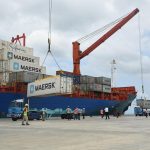Cargo movement in Summary
Both local and transit goods through the Port of Mombasa affected.
A single truck incurs a loss of $200 (about Sh23,880) on average, per day, when not moving
Cargo movement between port facilities and final destinations has slowed as truck owners opt to park their vehicles, as they monitor the political environment in the country.
The situation has brought to a near stop of operations by haulers operating within Kenya and the neighbouring countries that use the Port of Mombasa and the Nairobi Inland Container Deport (ICD). This is despite a high number of vessels discharging imports at the Mombasa.
Kenya Transporters Association (KTA) yesterday reported few activities on the Kenya roads and the 1,700 kilometre long Northern Corridor that runs between Kenya, Uganda Rwanda, Burundi and Eastern D.R. Congo.
“Most of our members have parked trucks to avoid any losses,” chief executive Mercy Ireri told the Star on telephone.
This is in relation to political activities where in the past; truck drivers have lost goods to hijackers and looting by criminal gangs.
In the 2007-2008 election cycle, the cargo transport sub-sector lost about Sh5.3 billion monthly according to KTA.
A stop in the movement also comes with losses where according to the association, a single truck incurs a loss of $200 (about Sh23,880) on average, per day.
At least 1,200 trucks cross the Malaba border into Uganda daily with about 300 using the Busia border.
The Standard Gauge Railway moves an average 700 containers to the Nairobi ICD daily, volumes that are evacuated to their final destinations by road (trucks).
“We make money when we are moving but it is necessary to mitigate risk,” Ireri said.
Uganda accounts for 83.2 per cent of transit cargo , South Sudan takes up 9.9 per cent while DR Congo, Tanzania and Rwanda account for 7.2 per cent, 3.2 per cent and 2.4 per cent, respectively.
The Long Distance Truck Drivers Association (LDTDA) chairman Nicholas Mbugua yesterday said: “We advised our members to stay at home until all is clear.”
The Mombasa Port and Northern Corridor Community Charter (MPNCCC) yesterday however said the corridor is safe, and expected the flow of traffic to be smooth.
“So far everything is okay. The government has assured us the corridor is secured,” chairman Gilbert Langat told the Star.
He however noted a slowdown on import activities after high volumes were witnessed weeks to the general elections.
MPNCCC comprises a total of 52 signatories (28 public, 18 private, three civil society, and three regional Economic Communities and Development Partners.
The business community includes cargo interveners and inspectors, logistics service providers, shippers, trade and commerce associations, regulators and policy oversight entities.
Last week, manufacturers said they had stocked up especially raw material to ensure smooth operations.
The Kenya Association of Manufacturers (KAM) said the move is as a result of uncertainty that comes with elections, where industries have previously been affected.
“Historically, there has been a slowdown in business in an election year, and this year is no different,” KAM acting CEO Tobias Alando told the Star.
Main cargoes that were imported in high volumes also included steel products, fertiliser, wheat, rice, sugar, fuel products and motor vehicles.
There is however no congestions so far coming with the reduced cargo evacuation, Kenya Ports Authority said yesterday.

